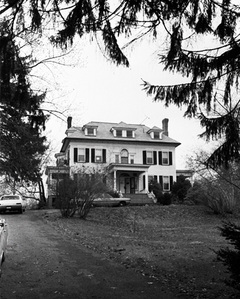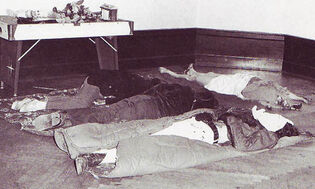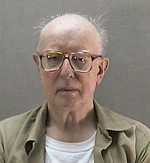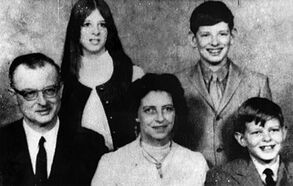John Emil List, a.k.a. "The Boogeyman of Westfield", was an American family annihilator and mass murderer who killed five members of his family on November 9, 1971, in Westfield, New Jersey.
Background[]
List was born in Bay City, Michigan as an only child to German American parents, John Frederick List Senior and Alma Maria Barbara List {nee Florence}. His parents were both Lutherans, with the child List often studying the Bible with his mother, as well as attending Sunday school. His mother was also known for her fierce protectiveness. As a child, List had no friends which was largely chalked up to his prohibition on leaving the neighborhood under his mother's strict instruction. He later served in the U.S. Army during World War II as a Second Lieutenant. He got his bachelor's degree in business administration and a master's degree in accounting after graduating from the University of Michigan in Ann Arbor, Michigan. List later went on to meet and marry a woman named Helen in 1951, and the two had children shortly after. On November 5, four days before the massacre, List asked his family how they would want their remains handled after death.
Familicide, Capture, and Incarceration[]

The List house.
On November 9, 1971, List left a note for the milkman to cancel delivery. Then he went into the kitchen and shot his wife in the jaw. Without moving her body, List went to his mother's third-floor apartment and shot her in the left eye. Her knees broke as she fell. List put her body onto a carpet runner and into a closet. List went back downstairs and dragged his wife's body into the ballroom, putting her body in a Boy Scout sleeping bag on the floor and tried to clean up the blood. Initially planning on waiting for his kids to come home from school to kill them, he had to pick up his sixteen-year-old daughter, Patricia, after she called from school, saying she was sick. He picked her up and brought her back to the house. As she entered, she was shot in the back of the head by her father, who dragged her into the ballroom and put her in another sleeping bag. List then left the house, doing some banking and mailing some letters. Later, he picked up his thirteen-year-old son, Frederick, from an after-school job. He shot and killed him as they entered the house, and his body was put with his mother and sister. John Jr., fifteen years old, came home from soccer practice early, which List was unprepared for. A struggle ensued, but List gained the upper hand, shooting him ten times. List put John with his mother, sister, and brother, straightened them out, draped towels over their faces, and then knelt down and prayed for them.

The crime scene of List's familicide.
After that, he mailed a written letter to his church's pastor. The letter was a detailed confession, but he also put it in an envelope with other documents. List wrote that his life had fallen apart. His wife frequently refused to attend church with him anymore. His professional life was also going to pieces, he was deeply in debt. List called the school, saying they would be gone for a while on a family trip to North Carolina. He ate dinner and slept in the billiards room. The next morning, he turned on all the lights, turned on music throughout a house intercom at a high volume and left. Before the massacre, Patricia had told her drama coach that she was worried about her father. She told the coach if he heard anything about the family going on vacation, it would mean that List had killed her and the rest of the family. On the night of the killings, the coach drove past the house, fell for List's trick when he saw the house lit up, and drove off. The house remained empty, save for the bodies, for nearly a month. On December 7, a neighbor noticed the lights flickering and that the place seemed empty and abandoned. The neighbors called the police, who found the bodies. Because John List was not among them, he was immediately named the prime suspect. But he was nowhere to be found.

List during the time of his apprehension.
List had moved to Colorado and had assumed the name of Robert Clark. He remarried and started a new life. His neighbor in Denver, As an avid reader of the tabloids, she saw the story about the family massacre in 1987. She knew it had to be the person she knew as Clark, but didn't report him to the authorities. When America's Most Wanted did a segment of the massacre in 1989, it reminded her of Clark, who had moved to Virginia with his second wife. She called the show and List was shortly arrested. At his trial, he claimed that he sent his family to heaven by killing them. Because suicide is interpreted as an "unforgivable sin" that would send the person who commits suicide to hell, especially by Catholics, List couldn't commit suicide. On April 12, 1990, List was convicted in a New Jersey court of five counts of first-degree murder. On May 1, he was sentenced to five consecutive terms of life imprisonment. He died of pneumonia on March 21, 2008.
Modus Operandi[]
During the family massacre, List shot all of his victims with either his father's .22-caliber Colt revolver; and a 1918 9mm German Steyr automatic handgun.
Known Victims[]

List with his family.
- The November 9, 1971 familicide:
- Helen List, 45 (wife; shot in right temple)
- Alma List, 84 (mother; shot above the left eye)
- Patricia List, 16 (daughter; shot in her jaw. passing through her brain, killing her instantly)
- Frederick List, 13 (son; shot in his left temple)
- John List, Jr., 15 (son; shot ten times (in his head and chest) after a struggle)
- Helen's unnamed mother (attempted; abandoned the plan when she was out of town)
Notes[]
- Prior to his arrest in 1989, List was considered a suspect for being "D.B. Cooper", a robber who hijacked Northwest Orient Airlines Flight 305, receiving $200,000 in ransom and four parachutes before jumping out of the plane's rear exit door, never to be seen again. The hijacking and robbery occurred less than three weeks after List disappeared, with the theory being that he had committed the crime for the money while on the run. List denied being Cooper, who remains unidentified to this day, and there was no direct evidence that implicates him. Subsequently, he has been cleared as a suspect.
On Criminal Minds[]
- Season Three
- "Children of the Dark" - List was mentioned by Morgan alongside Mark Barton as examples of family annihilators who kill their children out of mercy.
- Season Four
- "Normal" - While not directly mentioned or referenced in the episode, List appears to have been an inspiration for the episode's unsub, Norman Hill - Both were spree killers and family annihilators who worked in numerous financial positions, shared similar personalities as family men with quiet and reserved personalities, were in mental decline from losses in their lives (Hill's daughter was killed by a car, while List lost his job), placed blame on their families for the decline of their daily and professional lives, killed their victims by shooting, each didn't kill one of their family members (though Hill's daughter died beforehand, while List's mother-in-law lived from being out of town), left their families' remains in their homes for a prolonged period of time before police discovered them, and tried and failed to escape authorities before they were arrested (though List was a fugitive for 18 years, while Hill failed to get away in a police chase).
On Suspect Behavior[]
- Season One
- "Nighthawk" - While List was never directly mentioned or referenced on the show, he appears to be an inspiration for the episode's main unsub, Leonard Keane - Both were rampage killers who had problematic relationships with their family members, struggled to work, were under financial hardship, had wives with health problems (Keane's had a mental breakdown and was institutionalized, while List's had alcoholism from her previous husband), were harassed and degraded constantly by another person who troubled them (Keane was harassed by the father of one of his son's victims, while List was verbally emasculated by his wife), went into depression that drove them to murder, they killed five victims, and showed remorse for their crimes.
Sources[]
- Wikipedia's article about List
- Murderpedia's article about List
- Criminal Minds Sociopaths, Serial Killers & Other Deviants by Jeff Mariotte
- Righteous Carnage: The List Murders of Westfield by Timothy B.Benford & James P. Johnson
